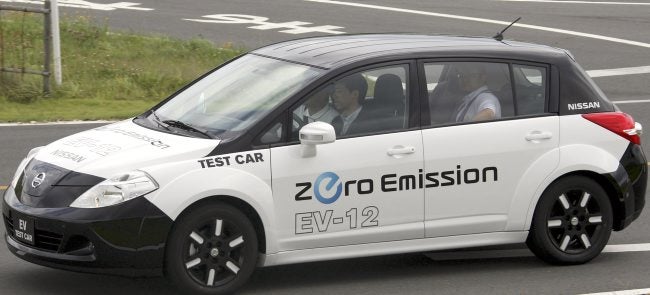Nissan reveals super-quiet, zero emission electric car

Your support helps us to tell the story
From reproductive rights to climate change to Big Tech, The Independent is on the ground when the story is developing. Whether it's investigating the financials of Elon Musk's pro-Trump PAC or producing our latest documentary, 'The A Word', which shines a light on the American women fighting for reproductive rights, we know how important it is to parse out the facts from the messaging.
At such a critical moment in US history, we need reporters on the ground. Your donation allows us to keep sending journalists to speak to both sides of the story.
The Independent is trusted by Americans across the entire political spectrum. And unlike many other quality news outlets, we choose not to lock Americans out of our reporting and analysis with paywalls. We believe quality journalism should be available to everyone, paid for by those who can afford it.
Your support makes all the difference.Nissan unveiled its super-quiet, zero emission electric car technology today, a key design for the company which has fallen behind in hybrid development.
Nissan showed the prototype in an existing Tiida bodyshape. It will reveal the car's exterior next week.
"Nissan will be a leader in zero-emission vehicles," company boss Toshiyuki Shiga said.
It is due to go on sale in Japan and the US next year. Nissan says it plans to mass produce zero-emission cars globally from 2012. Until then, it will produce all initially targeted 100,000 units at its Oppama plant, including export models.
The car uses a lithium-ion battery pack that is placed under the vehicle floor to allow for more cabin and luggage space. The braking system recharges the battery while the car is driving, extending the range to around 100 miles from a full charge. With the lighter weight and more energy efficient batteries, the new electric car can double the mileage of the current Hypermini model introduced in 1998.
Nissan shares the battery design with partner Renault as part of a cost-cutting effort.
Proponents of hybrids, like market-leader Toyota, the world's biggest car maker, say the limited driving range of electric vehicles makes them suited for daily commutes or shopping at best, and hybrids are the best all-round solution.
Hybrids have petrol engines as well as an electric motor and they charge themselves while running so they do not have to be plugged in for charging.
But Nissan said it plans to cut gas emissions by 90% by 2050, "a challenge that goes far beyond what hybrids can achieve but not electric vehicles."
Nissan's electric vehicle shows the driving radius within range of the car's charge on a dashboard navigation map, so drivers will not get stranded on the highway. It can also calculate if the vehicle is within range of a destination.
A handheld remote control allows a user to preset cabin temperature, set a timer for night time battery recharging, and to receive a message when the vehicle is fully recharged.
The new EV prototype hardly makes a sound when operated, and the company are studying ways to add noise to catch the attention of pedestrians for safety, officials said.
Nissan has promised to tackle the other widely viewed obstacle to the proliferation of electric vehicles - pricing.
Although Nissan has yet to announce the price, it said the electric vehicle would be "competitive" with regular gasoline vehicles.
Originally published in the Belfast Telegraph
Join our commenting forum
Join thought-provoking conversations, follow other Independent readers and see their replies
Comments